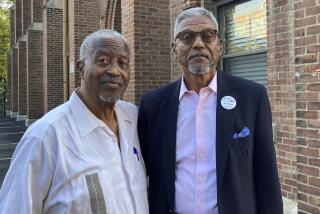White House Seeks to Reduce Aid for Nuclear Weapon Workers
- Share via
WASHINGTON — The Bush administration wants to remove some people from a compensation program for workers who became ill after working in Cold War-era nuclear weapon programs.
The administration says more study is needed to determine if some workers who helped mine uranium qualify for compensation. Critics say further delay means more eligible workers will die before getting any money.
“They’ve been stonewalling and it’s a crying shame,” said Ed Brickey, president of the Colorado Uranium Workers Council. “We have people who are dying because of where they worked.”
The administration wants to delay the payments until the completion of three ongoing studies, said Chris Ullman, spokesman for the Office of Management and Budget.
William Lambert, an epidemiologist at the University of Oregon working with the National Institute for Occupational Safety and Health, said the studies are looking at whether exposure to uranium and silica dust in the mines caused the illnesses.
It could be six months to a year before the studies are finished, Lambert said.
“The administration is shirking its moral and legal responsibility to a segment of society that is powerless because they’re old and sick. It’s a total disgrace,” said Lori Goodman, spokeswoman for Dine CARE, which represents Navajo Indians who worked in the uranium mines.
Ullman noted that the administration approved $84 million in supplemental spending to pay miners who qualified under the original compensation program and is seeking $97 million next year and a total of $710 million over the next 10 years.
The Radiation Exposure Compensation Act was passed by Congress in 1990 to compensate below-ground uranium miners and people exposed to radioactive fallout from nuclear weapon tests.
Aboveground uranium miners, ore-haulers and millers were added to the program last year and could begin applying for $100,000 payments in January. At least 141 ore-haulers and millers applied for compensation, but none has been paid.
Now the administration wants to remove those workers from the program until the studies are finished. OMB officials met with staffers from several senators earlier this month, briefing them on the administration’s position.
Wayne Hill, 69, of Grand Junction, Colo., is among those affected by the move. He worked for nine years hauling uranium from the mines to the mills in Colorado, Utah and New Mexico. He said he has photos of himself standing atop loaded trucks and in the mines, covered in uranium dust.
“[The government] wasn’t about to tell us what we were doing to ourselves,” Hill said. “We were up there committing suicide, and we didn’t even know it.”
Three months ago, Hill completed radiation treatments to shrink the cancer in his brain that had spread from his lungs. He said the $100,000 would help him pay medical bills.
More to Read
Sign up for Essential California
The most important California stories and recommendations in your inbox every morning.
You may occasionally receive promotional content from the Los Angeles Times.













